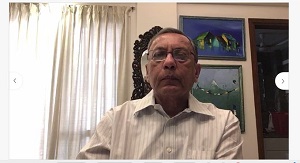The Vivekananda International Foundation organised a book discussion on “Kathmandu Dilemma: Resetting India-Nepal Ties”on November 05, 2021. The event was chaired by Dr. Arvind Gupta, Director, VIF. Author of the book Ambassador Ranjit Rae delivered a talk on the book followed by a discussion of the book by Prof. Sangeeta Thapliyal, Jawaharlal Nehru University, and Lt Gen Shokin Chauhan (Ret.), 11th Gorkha Rifles, Indian Army.
India and Nepal share an age-old intimate relationship. The relationship has been nursed by the people to people connect based on the civilisational, cultural, political and trade links between the two countries. However, in the past few years, there has been a projection of a general anti-India notion by the elites of Nepal across Nepal. The border blockade by the protesting Madhesi population against the 2015 Constitution of Nepal had given fuel to the anti-India sentiments. Yet, when looked closely, these sentiments emanate from a certain section of the Nepalese population. The ruling elites who continue to dominate the politics of the day have contributed a lot in making the anti-India narrative, which is far from reality.
In this light, the “Kathmandu Dilemma: Resetting India-Nepal Ties” is a most contemporary book which deals with almost all the aspects of the India-Nepal relations. It answers the questions raised by the younger generation today in India that “why don’t they like us?”. This is a question that the Prime Minister of India, Narendra Modi, had posed to the author once. These are the same elites in Nepal who have put socio-cultural and religious ties on a hagiarchy level. For instance, the Mughaliya notion towards India invokes the fact that India was under the rule of Mughals for a long, contrary to Nepal’s non-colonisation by any powers.
The ruling elites in Nepal have used India as a smokescreen to serve their intersts and hugely discriminated against their own population residing in the southern parts of Nepal known as terai for their close socio-cultural and matrimonial ties with them India. Therefore, it is clear that the ruling elites do not represent the feelings and sentiments of the entire Nepal. Also, elite perceptions in Nepal are the ones that have generally given rise to questions in India like why don’t they like us?
There are also questions of revising the 1950 Treaty of Peace and Friendship. Again, the ruling elites have been a dominant section in repeatedly raising such questions on the political platforms. While Nepal itself is confused with the nature of revisions to be carried out in the treaty, one needs to focus on the brighter side of the treaty. The treaty has been a great facilitator of the free movement of people across the border. It has been a gateway to socio-cultural exchanges between the two countries. It was the 1950 treaty that contributed to the country’s peace and stability during the Maoist revolution. Noteworthy, had there been no such treaty, the people of Nepal would not have been able to enter India as freely during the Maoist insurgency. Nepal would have witnessed refugees and displacement. On the other hand, the Maoist leaders too took shelter in India. Therefore, India’s contribution to the democratic aspirations and democracy was in line with India’s commitment to peace and stability in Nepal.
At the same time, India’s Nepal policy multiple objectives, including peace and stability in Nepal, have met enormous challenges. Leaders like KP Oli have worked as disruptive and hostile forces who had played the China card despite India’s best efforts to better India-Nepal ties. Today China is a reality in Nepal, and it is concerning to see the high-handedness of China in the internal affairs of Nepal. Leaders like KP Oli compromise not only the sovereignty of Nepal but also overlook the Chinese wrongdoings in the country.
With these existing circumstances, India’s goodwill has been reaching the people of Nepal. India and Nepal are seeing better equations on the economic front, including in the hydropower and petroleum supply sectors from India to Nepal through a newly built cross-border oil pipeline. Also, the contributions made by the Nepali Gorkha soldiers in the Indian Army continues to provide a solid ground to the bilateral ties.








Post new comment